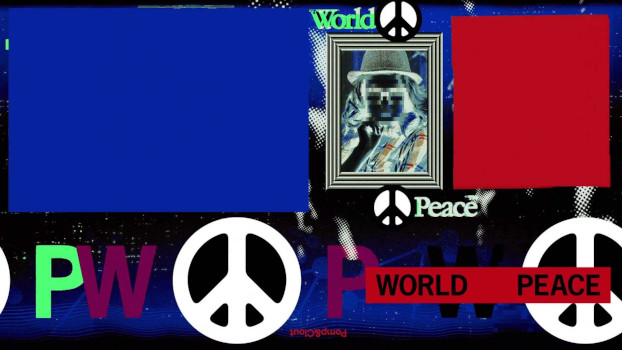詳細はこちら | 🤡pullinginward@protonmail.com🌏 | Anything can happen in life, especially nothing.
HOME / MUSIC / LIT / ANIME / MANGA / TV / FILM / COMICS / TOONS / VIDYA / ART
Currently watching: The Kardashians, Keeping Up With the Kardashians in August, 2023 | OK, I already know what you're thinking, and it's not even uploaded here, why am I talking about it? It would be easy though reductive and frankly boring to simply dismiss this as a 'guilty pleasure'. There's more to it than that. You see, I made this new friend recently, name of "Jules". We've been hanging out a lot, ■■■■■■■ a lot of ■■■■ together, watching a lot of TV and indulging our most base desires (sometimes I worry if I'm not a bad influence on them ... setting them down a dark path, taking them with me ... I wonder which one of us is the enabler?). With Disney+ subscription in hand Jules had something to show me—and you know me, I'm an open-minded sort of person, right? I can be somewhat histrionic and the usual thespian pursuits, so we started with the most recent incarnation that is the theatre of their lives, The Kardashians, and have then gone back to the original E! series. It's a fascinating study of a family's journey through the trials and tribulations of life with character arcs now stretching beyond 15 years. There is a deep and rich mythos to the Kardashians that I would liken to that of The Olympians. Interestingly, much of it lies outside of the show itself—on social media, in the news, online—thus one is rewarded for their worship of these idols across all platforms. I'm lucky to have Jules here to keep me updated on all this (sometimes we have to pause the show) because I just don't have time to keep up with anything anymore since I got a steady job.
- "Brass Eye was a British television comedy series parodying current affairs news programming. A series of six episodes aired on Channel 4 in 1997, and a further episode in 2001. The series was created and presented by Chris Morris."
- "As Brass Eye turns 20, it’s worth remembering that it probably shouldn’t have made it to our screens at all. When Chris Morris’s epochal media satire first aired, the broadcasting code forbade programme makers from misleading interviewees for entertainment purposes. Channel 4 defended the show and an amendment informally known as “the Brass Eye clause” was incorporated into the code."
- "It’s hard to overstate the shock of initial exposure to Brass Eye. The Day Today, which aired in 1994, had suggested that Morris was an unusually gifted writer and performer. But this was another level altogether – an artist operating fearlessly at the peak of his powers. From the captions to the graphics, the music to the magnificently mangled language, it seethed with ideas, almost all of them perfectly realised." -Phil Harrison
30 Jan 2017
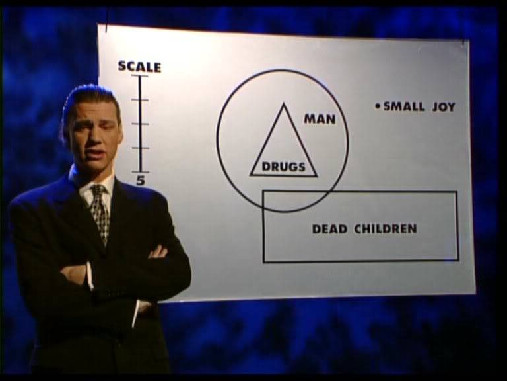
- "Every so often, TV executives - who are in so many ways their own worst enemies - come up with a new buzz phrase for a certain, voguish style of programming. Then, almost as soon as it's been invented, all personnel associated with the shows rush to deny that their particular opus fits into the category. Once soaps, then Lager TV and most recently docu-soaps all went this way. The latest thing is the "slackcom" - the sitcom for the slacker generation."
- "Spaced is a British television sitcom, about the (comedic and sometimes farcical and action-packed) misadventures of Daisy Steiner and Tim Bisley, two twenty-something Londoners who, despite only having just met, decide to move in together after she gives up on squatting and he is kicked out by his ex-girlfriend."
- "The show has a distinctive cinematic style set by Wright and is shot with a single camera. In addition to borrowing liberally from the visual language of film (in particular some kind of unspecified genre films), it has particular stylistic mannerisms, such as the recurring device of scene changes occurring in the middle of a pan. The series' atmosphere is also established by the use of a particular flavour of contemporary dance music on its soundtrack. Pegg and Stevenson pitched the show to LWT as "a cross between The Simpsons, The X-Files and Northern Exposure."
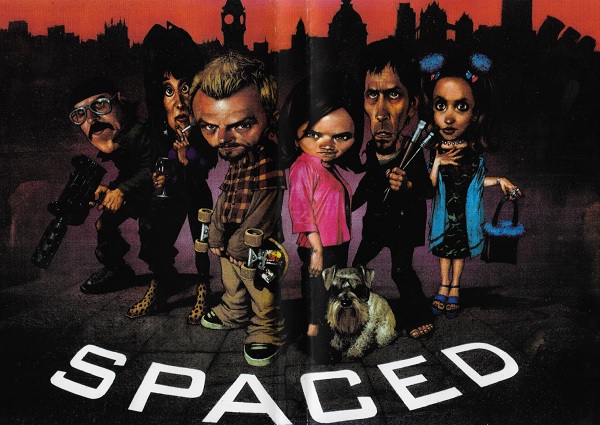
- "ernard Black, the owner of Black Books, is not a man who believes in good service, or even just service. Bernard doesn't bother with flashy window displays, three for the price of two offers, or the practice of giving readers suggestions – unless they're wildly offensive. Bernard would rather just sit by the till, reading, drinking, smoking and being foul to people. In short, this is the perfect bookshop."
- "It must be perilously tempting for a bookshop owner to follow Bernard's bad example (clearing the shop at the end of the day by hollering at customers through a loudhailer, for instance), but it would be hard for them to do so with such panache. The Channel 4 sitcom, which kicked off in the early noughties and ran for three series, showcased the talents of Dylan Moran as Bernard, Tamsin Greig as his friend Fran, and Bill Bailey as the sweet, verbally abused ("You know what you are? You're a beard with an idiot hanging off it") shop assistant Manny."
- "While Bernard's wine-lust is played for laughs, we do get a glimpse of the despair underneath, of how chaotic and lonely Bernard's life is – a point that's magnified when you watch the three series as a box set, rather than a weekly dose. And yes, there are some huge guffaws. Moran has never been funnier than when he's in full rambling, ranting, ridiculous flow as Bernard, who can make even a tax return funny. "What is your mother's maiden name?" the form asks. "What's her first name?" he wonders. "I just knew her as 'Ma'! That'll have to do."" -Vicky Frost
4 Dec 2009
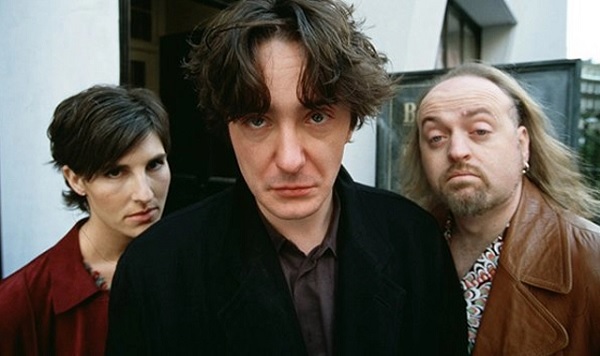
- ""Look Around you" offers a combination of satire and homage to British educational programs of the 1970s and 1980s. A different scientific topic is tackled in each episode, including calcium, water, germs and iron, and running gags continue from week to week, as the series goes on."
- "Every joke hits the same target: how readily we swallow what the TV feeds us. As with Chris Morris’s Brass Eye, you’re bombarded with important-sounding nonsense, such as germs originating in Germany, or champagne reacting violently with sulphur to form sulphagne. Some of the presented facts are clearly bats; others seem plausible; and some require a second viewing to catch – man making use of iron since the stone age, for example, or maths being an acronym for Mathematical Anti-Telharsic Harfatum Septomin."
- "The programme fixes on all the absurdities that those vintage school programmes presented as normal, or glossed over entirely. There are the white-coated scientists whose faces you never see (why?); the clock countdown that precedes the title sequence; the anonymous hands creeping over flasks labelled with Dymo tape (“Michelle”, “Meths”, “Moths” and “Maths”). There’s the twinkly Yamaha CS-70 soundtrack, scientifically designed to seduce Boards of Canada fans." -George Bass
28 Jan 2016
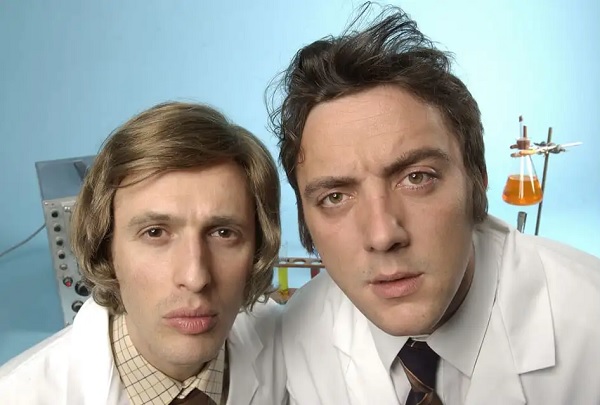
- "Garth Marenghi's Darkplace is a British horror parody television series created for Channel 4 by Richard Ayoade and Matthew Holness. The show focuses on fictional horror author Garth Marenghi (played by Matthew Holness) and his publisher Dean Learner (played by Richard Ayoade), characters who originated in the Garth Marenghi's Fright Knight stage show."
- "Darkplace is presented as a lost classic: a television series produced in the 1980s, though not broadcast at the time (except in Peru.) The presentation features commentary from many of the "original" cast, where characters such as Marenghi and Learner reflect on making the show. Darkplace parodies the fashion, special effects, production gaffes, and music of low-budget '80s television, as well as the modern practice of including commentary tracks on DVD releases of old films and television shows."
- "The spoof comedy series, released in 2004, lampoons 1980s television drama, particularly horror, sci-fi, and "the rampant egotism of self-appointed 'mastermind' authors." The show presents Garth Marenghi's Darkplace as though it were a real, low-budget television series, produced in the 1980s, and now getting its first screening, framed as part of a director's commentary series. Darkplace's fictional show-within-a-show includes deliberately poor production and special effects, sub-par acting, choppy editing and storylines that are "severely flawed and open-ended". This is interspersed with present-day interviews with the cast."
- "The series' fictional premise is that some time in the 1980s, best-selling horror author Garth Marenghi and his publisher/publicist, Dean Learner, made their own low-budget television series with a single intent: "to change the evolutionary course of Man over a series of half-hour episodes." Set in Darkplace Hospital, "over the very gates of Hell", in Romford, London, Garth Marenghi's Darkplace shows the adventures of Dr. Rick Dagless, M.D., as he fights the forces of darkness while simultaneously coping with the pressures of "day to day admin." Within this fictional context, Marenghi wrote 63 teleplays from which 50 shows were produced (in the commentary, he mentions that there were 67 episodes at one point, though it may have been intentional by Holness to show discontinuity); however, Channel 4 was eventually forced to reject the show due to its "radicality", though Marenghi also cites possible government suppression: "MI8, which is actually three levels above MI6, pulled the plug. And they did it because I knew the truth."
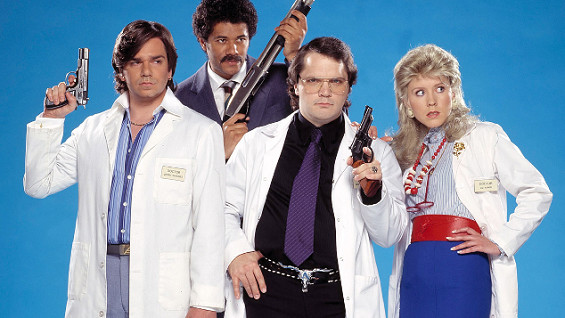
- "It's Always Sunny features what must be the most venal, least lovable gang yet assembled on TV – in a sitcom, at least. Theoretical friends Dennis, Mac and Charlie, plus Dennis's sister, Dee, have bought a blue-collar boozer called Paddy's. They spend their days dodging work and dreaming up schemes, amoral and brattish, unrepentant and unreconstructed, and endlessly unsuccessful – they are bailed out of bankruptcy at the start of the second series by Dennis and Dee's father, played by Danny De Vito."
- "In fact, It's Always Sunny is darker still than Curb Your Enthusiasm, which it superficially resembles (no laugh track; Dee is played by Kaitlin Olson, aka Cheryl's horrific sister). But this isn't a show about negotiating social niceties; it's about exploitation and malice, and its scripts wander into areas where other sitcoms fear to tread (racism, abortion, drink-driving, cancer, jihad)."
- "Take "Dennis and Dee Go On Welfare" – a typical episode from series two (only the first three of the five since 2005 are available in the UK) – in which the siblings become convinced they're wasting their talents, quit the bar and plan to create great art, but rapidly become crack addicts. It's a terrific mix of highbrow and lowbrow: niftily plotted, wittily edited, brilliantly performed, and casually offensive."
- "Yet It's Always Sunny is funny not for its shock value, but because it feels like a recognisable slice of life. For all its toxicity, it is weirdly cheering – invigorating, even. Acid can be addictive." -Catherine Shoard 14 May 2010

- "Hosegate is a metropolitan borough filled with twits, buffoons, imbeciles, gufftraps, fools, dolts, nincompoops and idiots. It's also home to webmaster Nathan Barley, who's outwardly sure he's the coolest thing going, but secretly afraid he's not. And he's also convinced that because he owns a camera, has a web site and some small knowledge of Internet publishing, he also has talents in that area."
- "From cereal cafes to breakfast raves to adult ball pools, from TV shows like Sex Box to newspaper features about the “meaning” of the Man Bun hairdo to inexplicable online phenomena like Ello, our world has been Barleyed. It is uncanny. Created as a comic figure, Nathan has become an insult and a signifier and maybe even – here’s the frightening part – a role model. At 10 years’ remove the show seems less a comedy and more a documentary about the future."
- "“Back when we were shooting it,” says the actor Nicholas Burns, who played Nathan, “I remember one producer saying, ‘This show will date terribly. In three or four years it’ll look awful.’ But watching it again, you see how prescient it was. It really is the world we live in now. A friend who lives in Dalston told me they saw someone riding a penny farthing the other day. It’s unbelievable really.”"
- "Perhaps this is why Nathan Barley fans can still watch the show with affection. It is both an alternative vision of now and an image of the way things used to be, when you really could just ride into Shoreditch on a plastic tractor with a tiny bowler hat on your head and start some kind of a career. Things are less forgiving today." -Andrew Harrison 10 Feb 2015
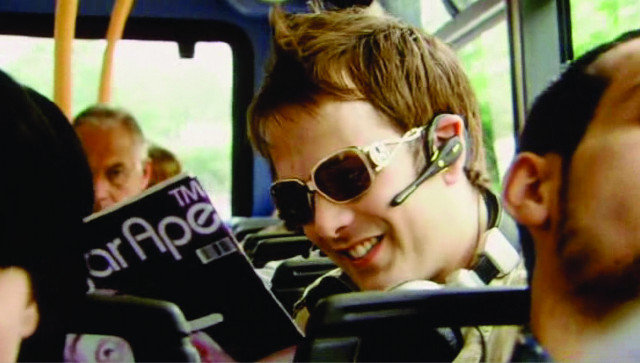
- "Wonder Showzen contains offensive, despicable content that is too controversial and too awesome for actual children. The stark, ugly and profound truths Wonder Showzen exposes may be soul-crushing to the weak of spirit. If you allow a child to watch this show, you are a bad parent or guardian."
- "When Wonder Showzen debuted 15 years ago, it was unlike anything that had been on TV before. Influenced as much by Sesame Street as it was by Noam Chomsky, the short-lived MTV2 series was a visually jolting, politically pungent faux kids’ show featuring puppets, man-on-the-street interviews, animated segments, and kiddie-voiced “documentaries.”"
- "It’s a photo negative of Sesame Street – an image of wholesomeness and family values flipped with belligerent on-the-street bits starring Clarence the puppet, a squad of precociously venomous reporters called the Beat Kids, and storylines starring Chauncey and his felt-covered friends that aim for sacred cows from the lowest possible bar."
- "Watch any TV comedy long enough, and you subconsciously pick up where its taboos are, the omnipresent line that helps define every joke. These borders never existed on Wonder Showzen. The tone was acidic, and never righteous, perhaps because it recognized that we were too far gone. Showzen had contempt for a society it saw as cruel, self-absorbed, and unsustainable, and today that feeling is shared more acutely around the world."
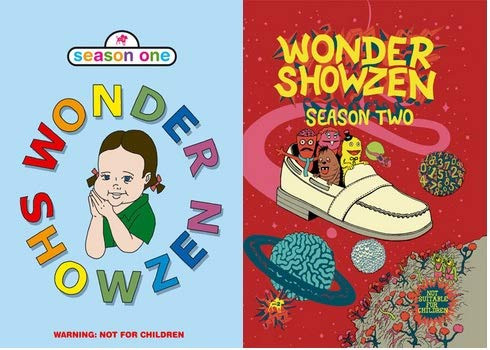
- "As it pivots from the existential to the profane to the grim, Snuff Box makes little effort to orient the viewer because disorientation is the point: The show has to overtly discard the expected rhythms of sketch comedy—the expected rhythms of life, really—before you can hear its own surreal song of death, vice, and horse piss."
- "Premiering in 2006 with little promotion, the part-sketch, part-narrative series — which to be fully appreciated should be consumed as a whole, like a great album, and not in snippets on YouTube — didn’t make a huge impact with audiences like some other British comedies of the time. But for many of those who have found it, it feels like belonging to an exclusive club not unlike the one that the two main characters belong to in the show."
- "But fans who encountered videos online were getting an incomplete picture. By chopping Snuff Box into small pieces, the Internet forced it into the box-of-chocolates format that Berry and Fulcher had purposely avoided. For one thing, short clips can’t capture the trippy way that segments seep into each other. In a full episode, you might see Fulcher’s pervert walk down the street, romancing a lollipop, only to have the camera linger on a woman perusing real-estate listings—and then the shot cuts to Berry and Fulcher in their hangman personas, observing the woman from afar. This sets up a minute-long bit that, in turn, melts into a scene with yet another Fulcher character, a pleasant-looking old man who only says the word “fuck.” YouTube clips can give a glimpse of the show’s sensibility, but they amputate its hypnotic flow, showcasing individual lines from a work that was crafted in stanzas."
- "Every episode incorporates musical numbers. These appear with little fanfare, emerging organically from scenes that don’t appear to be fit for song."
- "So whenever I watch the final episode and hear that “can’t be in love if it’s plastic” refrain ramp up for the last time, I get a little teary. I wouldn’t expect to be so sentimental for a show as bleak and harsh as this one, but while Snuff Box is dark, it’s also ineffably joyful. Over six episodes, you get to experience the exhilaration of inhabiting a strange psyche. It’s less of a show than a horrible, wonderful place to visit again and again, noticing another perfect detail every time." -John Teti 21 Oct 2014
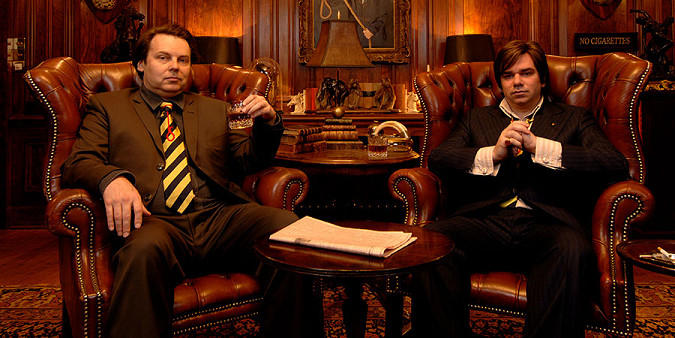
- "Limmy's Show! is a Scottish surreal comedy sketch show broadcast on BBC Two Scotland, written, directed and based on the 2006 podcast Limmy's World of Glasgow by Brian "Limmy" Limond, who stars as himself and a variety of characters in a series of observational, surreal, dark and bizarre sketches"
- "Deadpan skits about everyday annoyances. Glaswegian stereotypes treated with warmth rather than contempt. The charm of Brian Limond's absurdist comedy, first aired on BBC Scotland in 2010, is best summed up in a protracted sketch in which he asks which is heavier, a kilo of feathers or a kilo of steel."

- "The premise of Comedy Central’s Nathan For You doesn’t sound like the most forward-thinking show to ever be commissioned: it’s essentially a prank show without a reveal. Nobody is urged to smile after stepping into an unusually deep puddle, and no C-list celebrity jumps out of a wardrobe to ruffle any participant’s hair or receive a string of jovial profanities. Instead, it’s growing cult audience revels in its occasionally stifling atmosphere of sour awkwardness and perplexity. And yet, rising above cheap laughs, it also functions as a razor-sharp satire of commercialism, with a surprising undercurrent of genuine pathos."
- "Shot in a breezy, reality-doc style, its conceit is genius but oh so simple. Playing a well-meaning but much more socially inept version of himself, comedian Nathan Fielder tours real-life businesses that are either struggling in a changing market, or in dire need of an overhaul, posing as a consultant and “graduate of one of Canada’s top business schools with really good grades”. Observant first-time viewers will notice the credits tellingly identify said grades as A-, a B+, two Bs and a C, respectively. Fielder’s ideas are always radical, but often terrible, and at best painfully convoluted, often completely misunderstanding the core values and market of the business. But, in the glare of the camera and thanks to Fielder’s gentle and occasionally manipulative style, their exasperated founders and employees inadvertently allow the experiment."
- "If this all sounds rather mean-spirited in a still recovering business economy, then fear not. Nathan For You is also a traditional comedy of manners, and by and large, Fielder’s are always the worst in the room, as he passively aggressively defends his ridiculous ideas to participants usually far too polite to shut him down completely. Over the course of two seasons thus far, these ideas have included allowing attractive people to shoplift in fashion stores, creating software to send “lost” party invites to an email spam folder and in one of the show’s most memorable segments, advising a realtor to market her property on account of its complete lack of ghosts. This process involves a visit from an actual exorcist, culminating in a hysterical segment in which the realtor is herself purged of an inappropriate Swiss demon that has haunted her since her youth." -John Thorp 15 Oct 2015
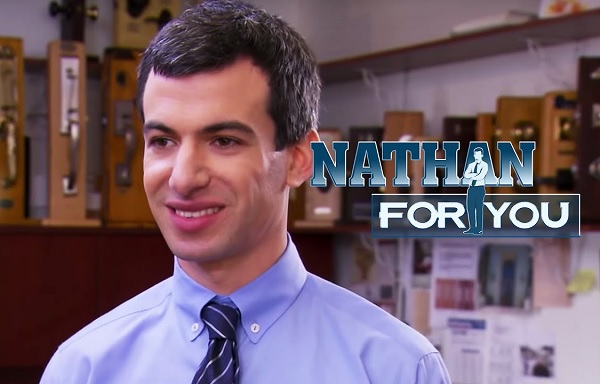
- "Each episode of World Peace was the Adult Swim standard of eleven minutes in length, and starred Million Dollar Extreme troupe leader Sam Hyde and frequent collaborators Nick Rochefort and Charls Carroll."
- "The show claimed to be set in a post-apocalyptic nightmare world that satirizes the current political climate. Each episode was made up of multiple sketches, connected by hyper stylized transitional graphics. The end of each episode featured a musical guest."
- "Adult Swim announced on December 5, 2016, that the show would not be renewed for a second season. The network faced internal opposition to its continuation, mainly regarding accusations of Hyde's alleged connections to the alt-right. According to Hyde, despite Adult Swim executives' apparent interest to pick up the show for a second season, Turner ultimately decided to cancel the show."
